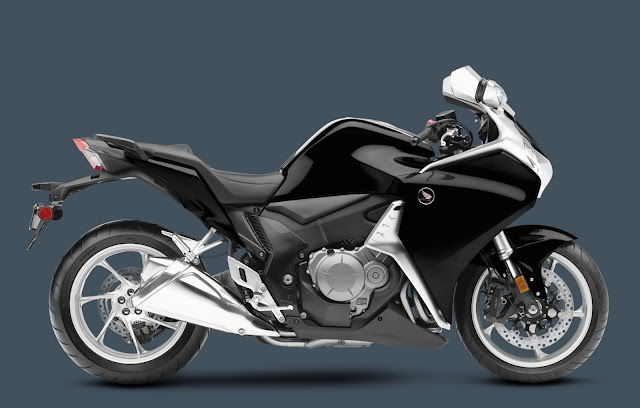Honda VFR1200F
The Honda’s
flexible, I70bhp V4 engine and protective fairing combined to provide its rider
with effortless highspeed performance.
The VFR handled well for a sports-tourer but was too heavy to be truly at home on a racetra Honda’s dual-layer ‘fairing was designed to duct cooling air to and from the V4 engine, as well as to protect the rider from buffeting by the wind.
Few bikes have been launched with such high expectations as the VFR 1200F with which Honda attempted to regain the sports-touring crown in 2010. The VFR initials had been synonymous with quality ever since 1985, when the original VFR750F had provided an unprecedented combination of performance and long-distance comfort. Numerous revisions had kept the VFR popular since then, but eventually a larger engined, more powerful model was needed.
Honda based the new-generation VFR on a V4 engine with capacity of I237cc - enough for a maximum output of I70bhp. Innovative engineering was needed to prevent the liquid-cooled V4 unit from growing too bulky. Measures taken to keep it compact included using a tighter, 76-degree Vee angle instead of the previous 90 degrees; setting the rear cylinders as the inside two of the four; and opting for a single overhead camshaft valve layout instead of the conventional dohc.
 |
The chassis followed VFR tradition in using an aluminium twin-spar frame, but featured some significant differences. The swingarm was a singlesided Pro-Arm design. It incorporated a drive shaft.
Meaning no messy chain for this sports-tourer. Styling and bodywork design were distinctive, notably the innovative dual-layer fairing, which ducted air to and from the engine.
Engine performance was much stronger than that of the previous VFR. The larger motor's advantage was clear as the Honda cruised effortlessly at speed. It was an appealing powerplant; flexible enough to pull from below 3000rpm without complaint, and with a seamless build of torque plus an involving V4 character. Top-end response was strong too. as the VFR accelerated towards a top speed of 175mph (282km/h), its rider protected by a reasonably efficient screen.
The VFR’s smoothness and long-legged feel helped make it relaxing
over long distances. This was particularly true when it w;as fitted
with Honda's optional Dual Clutch Transmission. This novel arrangement gave the
option of automatic shifting, or a paddle shift using the rider's left thumb
and finger. The system worked efficiently and was popular with some riders, but
added considerably to the bike’s price.
Honda’s design team had placed much emphasis on making the VFR feel compact, and for a big bike it was very slim and manageable. Despite weighing over 55lib (250kg) with fuel, it steered sweetly and was agile enough to encourage hard cornering. Braking was good too, although its ABS wasn’t the ultra-sophisticated system that Honda used on the Fireblade.
The VFR had an air of quality, notably in the rich paintwork, with its sparkling glass-flake finish. Instruments were clear; mirrors usefully wide; controls light and efficient. The accessory panniers and top-box were designed to flex on their mountings, improving high-speed stability. The VFR didn’t come with a centre-stand but Honda’s comprehensive accessory list included one, along with heated grips, satellite navigation system and a choice of alternative seats.
 |
In most respects the VFR was a fast and fine long-distance machine, but it had some surprising flaws. The 4-gallon (18.5-litre) fuel capacity was small for a sports-tourer, and meant that hard riding brought the bike’s practical range well below the 186 miles (300km) claimed by Honda. The VFR did not offer the adjustable screen or electrically adjustable suspension with which some rival sports- tourers could be fitted.
Partly for those reasons the VFR1200F was launched to a mixed
reception, rather than the universal praise that had greeted the VFR750F a
quarter of a century earlier. But the new V4’s key assets of effortless high
performance, sound handling and high-quality construction were universally
admired. It certainly made Honda a leading force in the sports-touring market
once again.
 |
The VFR1200F’s slim design helped make the hike roomy and manageable but contributed to its modest fuel capacity. The single-sided swingarm held a shaft drive system that was a key difference from previous chain-drive VFR models, highlighting the V4's status as a purpose- built sports-tourer.
Honda VFR1200F
- Specification : Honda VFR1200F
- Engine : Liquid-cooled dohc 16-valve 76-degree V4
- Capacity :1237cc (81 x 60mm)
- Maximum power :170bhp @ 10,000rpm
- Transmission : Six-speed, shaft final drive
- Frame : Aluminium twin spar
- Suspension : Telescopic front; single shock rear
- Brakes : Twin discs front; disc rear with ABS
- Weight : 587lb (266kg) wet
- Top speed : 175mph (282km/h)



















0 comments: